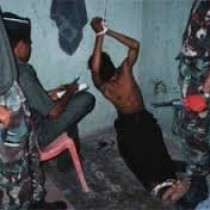
ETHIOPIA: What I saw in jig-jiga Central prison
In this article I will discover the ordeal and inhuman situation of the prisoners in jigjiga central jail known as ‘Jeel Ogaadeen’.
Thousands of innocent citizens from all part of the society are detained and arrested by the Somali regional state of Ethiopia. These prisoners are kept in different bases like Jigjiga Central jail, Garabcase military underground camp, Jijiga Zonal prison (gobolka), Gidhibka prison and many others in the region.
The construction of Jijigja central prison was started in 2000 by the Somali regional state of Ethiopia, and become functioning in 2002, and it is reported that the first prisoners were political prisoners. It was designed to hold up to 400 inmates. But today it is increasingly becoming a concentration camp for more than 4000 prisoners. Both the central and the regional governments are aware the fact that there is no enough space to accommodate such large number of prisoners and yet they turn blind on blind eye on this grave and cruel reality. The condition of the prisoners is very horrible and its freighting crowded cells with a lot of sick inmates made the diseases like cholera incontrollable. As result of this the number of deaths in this prison is shaking. During the days I was locked in the prison I witnessed 5 deaths and 3 critically ill inmates. There are constant pleas of help for medical intervention from the inmates but it falls on the deaf ears of the authorities.
In the prison there are two groups, the first group are handful inmates with no political connection. The second group - who are nearly 85% of the total inmates - are political prisoners. The treatment of the inmates is beyond human imagination. One breed or one injera is provided twice a day which is the only meal for the malnourished inmates. Water and latrines are the two important for a human to survive but these are the two scarcest resources in the prison. There are five latrines in total - three for the men inmates and one for women and the fifth is specific for the guards and other staffs of the prison. Due to the limited number of the toilets the hygiene of the cells is frightening and dreadful. Most of the inmates use cans and plastic bags to urinate in their own cells. The number of prisoners dying due to choleras and other communicable diseases is increasingly becoming natural in this prison. Some of the inmates told me that the government uses this situation as a torture techniques – they but the new inmates into most crowded and less hygienic cells to force them admit crimes they have never committed.
There are no medical professionals at the prison. When the health situation of some of the prisoners deteriorates they are escorted with a group of paramilitary personnel – known as Liyuu Police for treatment at Karamara Hospital but that is the most feared experience for the prisoners. ‘When you are escorted with the Liyuu Police you most likely to disappear for good’ one of the inmates told me. The high level of malnutrition and lack of enough food also increases the number of deaths from starvation. Starvation is also tool of interrogation and punishment that the jailers use. They refuse to feed the inmates who do not accept to confess made up crimes in front of national television or public gatherings.
Finally and my most shocking experience was the treatment of the families the inmates. In most of the time there is no time for visitors to meet with their loved ones in the prison. It takes months for the families to become aware the truth and the situation of their loved ones. I can’t hold my tears when I remember a mother who brought food and some medication for her son who deceased two weeks ago as a result of malnutrition. Some of them only hear from released inmates that family member died months ago in the prison, some of them cannot even locate where the bodies are buried.
In conclusion, the horror and the agony existing in the prisons of the Somali regional state of Ethiopia cannot be narrated by one or two articles. It is simple wake up call for humanity and particularly for Somali citizen’s in the region and abroad unveil the cruelty of the regime in Ethiopia. It is an attempt to promote justice, human right and to hold accountable those who are in the position of power in Somali regional state of Ethiopia.
BY Adan Yusuf
I am concerned citizen and I can be reached for feedback and farther information through E-mail: [email protected]
Leave a comment
| Copyright © 2009 - 2025 Sunatimes News Agency All Rights Reserved. |
| Home | About Us | Diinta | Reports | Latest News | Featured Items | Articles | Suna Radio | Suna TV | Contact Us |
 0
0 









ETHIOPIA: What I saw in jig-jiga Central prison
To lose one of your human rights may mean to you missing of all your rights. To miss your freewill for a single day is agony, how about being inmate without a court decision boundlessness time? According to the human right group report dating on 2012